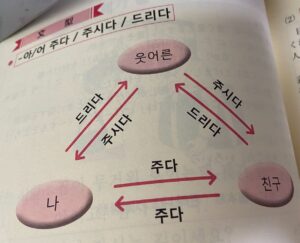안녕하세요. 토미입니다.
Let’s have fun learning an amusing language, Korean!
The theme of today’s class is【가방이 비싸 보이네요】“The bag looks expensive.”
Today, we will learn 아/어 주다, “to do something for someone.”
And 아/어 보다, “to try to do an action” and 아/어 보이다 “to look (adj).”
After completing today’s class, you will be able to say “You look so happy” in Korean.
I am so excited to see you guys pass TOPIK in the near future and be the super master of Korean!
그럼 시작할게요.
Listen to the Conversation
The theme of today’s conversation is【가방이 비싸 보이네요】“The bag looks expensive.”
Tammy came carrying a very decent bag today.
The bag looks so luxurious that Sangmin is trying to ask some questions.
Let’s listen to their conversation with English subtitles.
그럼 들어보세요!
- 상민:토미 씨, 그 가방 되게 비싸 보이네요! 어디서 났어요?
Sangmin:Tammy, that bag looks very expensive. Where did you get it? - 토미:아, 이거요. 우리 회사 사장님께서 모든 직원한테 이 가방을 사 주셨어요.
Tammy:Oh, this one. The boss of my company bought this bag for all the staff. - 상민:정말요? 그 사장님은 통이 크시네요!
Sangmin:Really? Your boss is very generous! - 토미:그렇죠. 그래서 우리는 사장님 댁에 편지를 보내 드렸어요.
Tammy:Yes, that’s right. So we sent a letter to his house.
그나저나 상민 씨, 이 가방 안을 봐 보세요!
Anyway Sangmin, take a look inside of this bag! - 상민:우와! 가방 안도 실용적이네요!
Sangmin:Wow! The inside is practical, too!
Vocabulary and Phrases
I will explain the vocabulary and phrases in the conversation.
- 상민:토미 씨, 그 가방 되게 비싸 보이네요! 어디서 났어요?
되게 means “very.”
But we’ve already learned a lot of expressions that mean “very” or “really,” right?
Let’s go through them briefly again.
We have words like 무척, 매우, 아주, 너무, and 엄청.
These words all mean “very/ a lot” and have very similar definitions.
Let’s look at the next sentence.
When you directly translate 어디서 났어요, 어디서 is “from where” and 났어요? is “did it come out from?”
So the natural translation would be “Where did you get it?”
- 토미:아, 이거요. 우리 회사 사장님께서 모든 직원한테 이 가방을 사 주셨어요.
직원 means a “staff.”
A synonym is 회사원 an “employee.”
- 상민:정말요? 그 사장님은 통이 크시네요!
통이 크다 means “to be generous.”
A synonym can be 친절하다 “to be kind.”
- 그나저나 상민 씨, 이 가방 안을 봐 보세요!
그나저나 means “anyway.”
A synonym would be 그건 그렇고 “anyway.”
- 상민:우와! 가방 안도 실용적이네요!
가방 means a “bag.”
There are also similar words to refer to a bag, such as 핸드백 “handbag” and 백팩 “backpack.”
I think you already know these words in English.
The next word is 안 “in/inside.”
So 저는 사무실 안에 있어요 means “I am in the office.”
The word 실용적 means “practical.”
Adjective words that finish with ~적, like 실용적, are usually pronounced with 쩍.
So 지적, a word meaning “intellectual,” will be pronounced 지쩍.
Grammar
아/어 주다/주시다/드리다
First, we will learn 아/어 주다 “to do something for someone.”
This grammar implies the action is beneficial to someone.
The polite form of 아/어 주다 is 아/어 주시다 or 아/어 드리다.
Why are there 아/어 주다, 주시다, and 드리다 ?

Good point! So, I prepared this picture for you.
Let’s look at it together.
When an upper positioned person, or an elder person is doing something beneficial for you, you use 아/어 주시다.
And if YOU do something beneficial for an upper positioned person, or an elder person, you use 아/어 드리다.
If you do something good to your friend, you use 아/어 주다.
And before we dive into this grammar, let’s see today’s all grammar here.
아/어 주다, 아/어 보다, 아/어 보이다 all have the same pattern of change 아/어 in the front.
In this type of grammar, you remove 요 from the 요 form, good bye 요, and add 주다, 보다, 보이다 afterwards.
First, we will check how to make 아/어 주시다 “to do something for someone.”
사장님께서 이 가방을 사 주셨어요.
The boss bought this bag for me.
In this sentence, 사장님, the boss, is buying a gift for Tammy.
So, you use the honorific version of 주다 , which is 주시다.
Let’s look at how to make this sentence.
The 요 form of 사다 “to buy” is 사요.
So, you remove 요 from 사요 and add 주셨어요 instead, to say 사 주셨어요 “bought it for.”
You read it as 사장님께서 이 가방을 사 주셨어요.
Let’s look at another example of using 아/어 드리다 “to do something for someone.”
Tammy said
우리는 사장님 댁에 편지를 보내 드렸어요.
We sent a letter to the boss’s house.
In this case, Tammy is sending a letter to the boss.
In other words, Tammy, the lower positioned person, is doing something good for the upper positioned person, the boss.
So, you use a humble verb 드리다 to make 아/어 드리다.
Let’s apply this grammar! 보내다 means “to send.”
The 요 form of 보내다 is 보내요, so you remove 요 and add 드렸어요 , to say 보내 드렸어요.
The whole sentence would be 우리는 사장님 댁에 편지를 보내 드렸어요.
Quiz
What goes into the parentheses?
부장님께서 저녁을 사 ( )
My chief treated me to dinner.
(1)주셨어요 (2)드렸어요
The answer is (1).
사다 is “to buy.” 요 form of 사다 is 사요.
You get rid of 요, goodbye 요 and add 주셨어요, to make 사 주셨어요.
Number two 드렸어요 is wrong because the chief, considered as the upper positioned person, is treating you, the lower positioned person.
In this case, 주셨어요 is natural.
The whole sentence would be 부장님께서 저녁을 사 (주셨어요).
아/어 보다/보이다
Let’s take a look at another grammar, which is 아/어 보다 “to try to do something” and 아/어 보이다 “to look (adj).”
You use 아/어 보다 “to try to do something” for verbs and 아/어 보이다 “to look (adj)” for adjectives.
In the conversation, Tammy says,
가방 안을 봐 보세요.
Take a look inside this bag.
The 요 form of 보다 is 봐요.
So, you remove the 요 from 봐요, goodbye 요 and add 보세요 to say 봐 보세요 “try to look.”
In other words, “ take a look” in English.
Next, let’s look at 아/어 보이다 “to look (adj).”
As you can see, you use an adjective to describe “to look like an adjective.”
For example,
그 가방 되게 비싸 보이네요!
That bag looks very expensive!
To make “to look expensive,” think about the 요 form first.
요 form of 비싸다 “to be expensive” is 비싸요.
Then remove this 요 and add 보이다 instead.
It becomes 비싸 보이다 “It looks expensive.” You read it as 그 가방 되게 비싸 보이네요!
Quiz
Let’s take the final quiz to improve our understanding.
What goes into the parenthesis?
상민 씨는 나이보다 ( ).
Sangmin looks younger than his age.
(1)어려 보여요 (2)어려 봐요
The answer is (1). 어리다 is “to be young.”
You want to use 아/어 보이다 to say “to look young.”
First, 요 form of 어리다 is 어려요.
Say goodbye to 요, and add 보이다 instead to make 어려 보이다 “to look young.”
When you make 어려 보이다 to 요 form, it will be 어려 보여요.
The whole sentence would be 상민 씨는 나이보다 (어려 보여요).
Conversation (Korean only)
Let’s listen to the conversation again but this time only in Korean.
I am sure you can hear more words and grammar this time.
그럼 확인해 보세요.
- 상민:토미 씨, 그 가방 되게 비싸 보이네요! 어디서 났어요?
- 토미:아, 이거요. 우리 회사 사장님께서 모든 직원한테 이 가방을 사 주셨어요.
- 상민:정말요? 그 사장님은 통이 크시네요!
- 토미:그렇죠. 그래서 우리는 사장님 댁에 편지를 보내 드렸어요.
- 그나저나 상민 씨, 이 가방 안을 봐 보세요!
- 상민:우와! 가방 안도 실용적이네요!
Conversation Practice
Let’s read it out loud together.
그럼 큰소리로 읽어 보세요!
- 상민:토미 씨, 그 가방 되게 비싸 보이네요! 어디서 났어요?
Sangmin:Tammy, that bag looks very expensive. Where did you get it? - 토미:아, 이거요. 우리 회사 사장님께서 모든 직원한테 이 가방을 사 주셨어요.
Tammy:Oh, this one. The boss of my company bought this bag for all the staff. - 상민:정말요? 그 사장님은 통이 크시네요!
Sangmin:Really? Your boss is very generous! - 토미:그렇죠. 그래서 우리는 사장님 댁에 편지를 보내 드렸어요.
Tammy:Yes, that’s right. So we sent a letter to his house.
그나저나 상민 씨, 이 가방 안을 봐 보세요!
Anyway Sangmin, take a look inside of this bag! - 상민:우와! 가방 안도 실용적이네요!
Sangmin:Wow! The inside is practical, too!
Homework
We have two assignments for today.
The first homework is to write sentences using the grammar we learned today.
First, let’s use 아/어 주다 “to do something for someone.”
For example, I would write like this.
- 어머니가 저한테 사과를 보내 주셨어요.
My mother sent me apples.
Second, write sentences using the grammar 아/어 보다 “to try to do something.”
For me, I would write
- 올해는 춤을 배워 보세요!
Why don’t you try to learn a dance this year!
The second homework is memorizing vocabulary.
Please memorize 40 vocabularies from #721 to #760 on page 10 of the Elementary Vocabulary List.
You can take this 40-word quiz on my website for free, so please check it out as well.
That’s all for today! You guys are so wonderful!
I am checking you guys’ comments every time and am very delighted.
Keep up your good work.
그럼 오늘도 행복 가득, 웃음 가득한 하루 되세요! 한국어 화이팅, 화이팅, 화이팅!!
Vocabulary Test : 40 Questions
Share your Quiz result through Twitter!



